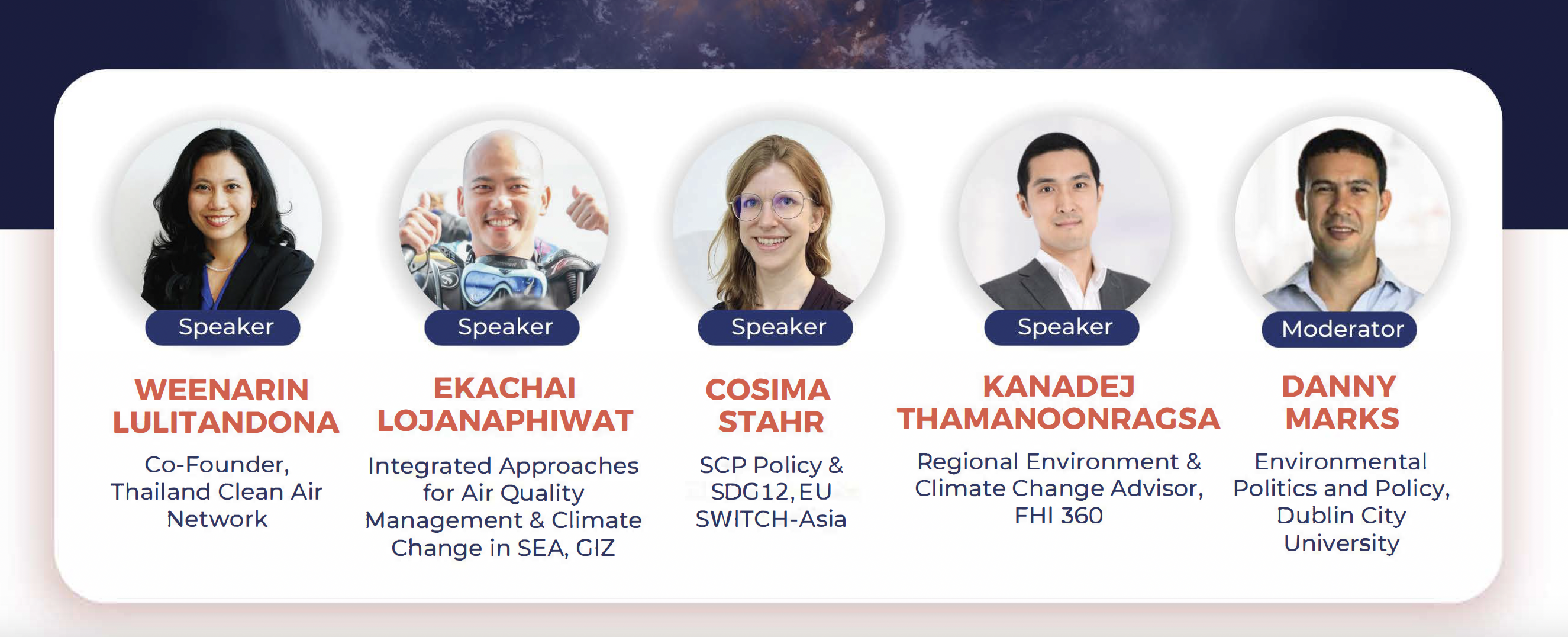
Date: 6 June 2023 I Time: 14:00-15:30 I Registration Deadline: 31 May 2023 I Registration Link: bit.ly/UN_Clean_Air
Background
With ‘about 4 billion people — 92 per cent of Asia and the Pacific’s population — exposed to levels of air pollution that pose a significant risk to their health’, this man-made crisis demands urgent attention and coordinated action. Air pollution is inescapable and pervasive, impacting your children’s lung development, shortening life spans, increasing miscarriages and causing a slew of other human, environmental and economic consequences.
Thailand, a dynamic country of over 69 million, is home to the world’s most-polluted cities. Amongst the various air pollutants, particles less than 2.5 micrometers in diameter, also known as Particulate Matter 2.5 or PM2.5, poses the greatest risk to health. PM 2.5 are small enough to lodge in the bloodstream and can cause myriad adverse health effects with sustained exposure. Whether burning in the open, in both fields and forests, car combustion, or industrial pollution – the effect is clear, Thai people are feeling severe health effects, with 200,000 hospital admissions in just one week of March, 2023, and in the first 3 months of 2023, 1.73 million people have fallen ill in Thailand as a result of air pollution.
The issue is not just relegated to Thailand or Asia. Mortality attributable to air pollution contributes an excess of over 7 million deaths globally, of which two-thirds occurred in the Asia Pacific Region. The 2022 update report by the Lancet Commission on pollution and health provides data in support of pollution being the world’s largest environmental risk factor for disease and premature death. The impact of pollution on health remains much greater than that of war, terrorism, malaria, HIV, tuberculosis, drugs, and alcohol, and the number of deaths caused by pollution are on par with those caused by smoking.
The Lancet Comission 2022 update report stated verbatim that: “Pollution, climate change, and biodiversity loss are closely linked. Successful control of these conjoined threats requires a globally supported, formal science–policy interface to inform intervention, influence research, and guide funding. Pollution has typically been viewed as a local issue to be addressed through subnational and national regulation or, occasionally, using regional policy in higher-income countries. Now, however, it is increasingly clear that pollution is a planetary threat, and that its drivers, its dispersion, and its effects on health transcend local boundaries and demand a global response. Global action on all major modern pollutants is needed.”
About the session
Join us for a multistakeholder dialogue comprised of organizations working in national contexts of SEA, the ASEAN, and EU level. Aligning climate change and human rights in supply chains with the transboundary haze problem and right to breathe clean air.
A clear co-benefit of the transition to clean energy and lowered emissions is improved air quality. The thorough Air Pollution in Asia and the Pacific: Science-based Solutions, for example, is a ‘comprehensive scientific assessment of the air pollution outlook in Asia and the Pacific with 25 policy and technological measures that will deliver benefits across sectors’- yet still more action is needed to connect climate change mitigation projects & funding mechanisms to the right to a healthy environment -- including clean air. Acknowledging this right then begs, in the movement towards human rights in supply chains and responsible business, how might we catalyze global development prioirties to respect this human right? And, how might global pressure & grassroots action coalesce to be a lever for systemic change at the level of national & regional policy?
Objectives
The key objectives of this session are to:
-
Mainstream the notion that clean air is a basic human right, a values-based paradigm that is anchored in concepts related to structural violence & drawing on historical and ongoing patterns of inequality such as colonialism.
-
Commit to integrating transboundary haze mitigation & the human right to a clean environment into climate change mitigation project scopes.
-
Strengthen the outline for long-term strategic plans to address air pollution hazards affecting Asian citizens and workers across sectors, in compliance with human rights in supply chains.
-
Create the relational underpinnings for multistakeholder collaboration towards clean air programming, in support of national and regional policy change in Asia.




